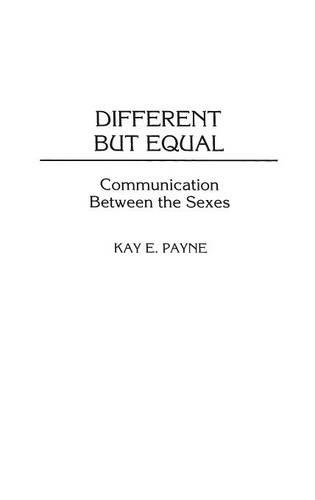
Different but Equal: Communication Between the Sexes
(Hardback)
Publishing Details
Different but Equal: Communication Between the Sexes
By (Author) Kay Payne
Bloomsbury Publishing PLC
Praeger Publishers Inc
28th February 2001
United States
Classifications
Tertiary Education
Non Fiction
Sociology: family, kinship and relationships
Social, group or collective psychology
Communication studies
305.3
Physical Properties
Hardback
240
Description
This study presents a theoretical and practical discussion of the changes that have occurred between men and women and how the sexes relate to one another from social, political, and ethical perspectives. Not only do men and women reflect different gender roles through communication, but they are also impacted by communication about gender, especially from the media. Gender differences in communication have gained political importance due to the increasingly relevant issues of sexual harassment and political correctness. These social and political changes have influenced our value systems and have given the study of gendered communication an ethical importance. Payne argues that religious ideology is an important aspect of gendered development and that biological, psychological, social, and cultural phenomena also affect sex roles. This volume will appeal to scholars and students in the communications disciplines as well as psychologists and sociologists. Organized around three major themes--the construction of the gendered self, the differences between men and women as they relate to one another through language, power, and nonverbal communication, and the effects of gendered communication in leadership and the media--this work covers much ground on the topic of communication between the sexes.
Reviews
[S]ucceeds quite well in advancing the cause of the masculine men and the feminince women.... provides a very interesting review of the various strategies that women and men employ to alleviate the cognitive dissonance they experience as they attempt to reconcile (or compartmentalize) more traditional religious beliefs with the current realities of communication at work, in the family, and within society in general....[w]ell suited to instructors at conservative religious institutions whose students would benefit for a text that reflects ideas similar to their own. For these students, Different but Equal could function as a stepping stone towards greater appreciation of women and femininity and of the ways in which women and men often engage in comunitcation from very different perspectives.-Communication Research Trends
"Succeeds quite well in advancing the cause of the masculine men and the feminince women.... provides a very interesting review of the various strategies that women and men employ to alleviate the cognitive dissonance they experience as they attempt to reconcile (or compartmentalize) more traditional religious beliefs with the current realities of communication at work, in the family, and within society in general....well suited to instructors at conservative religious institutions whose students would benefit for a text that reflects ideas similar to their own. For these students, Different but Equal could function as a stepping stone towards greater appreciation of women and femininity and of the ways in which women and men often engage in comunitcation from very different perspectives."-Communication Research Trends
"[S]ucceeds quite well in advancing the cause of the masculine men and the feminince women.... provides a very interesting review of the various strategies that women and men employ to alleviate the cognitive dissonance they experience as they attempt to reconcile (or compartmentalize) more traditional religious beliefs with the current realities of communication at work, in the family, and within society in general....[w]ell suited to instructors at conservative religious institutions whose students would benefit for a text that reflects ideas similar to their own. For these students, Different but Equal could function as a stepping stone towards greater appreciation of women and femininity and of the ways in which women and men often engage in comunitcation from very different perspectives."-Communication Research Trends
Author Bio
KAY E. PAYNE is a Professor in the Department of Communication at Western Kentucky University./e
